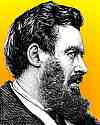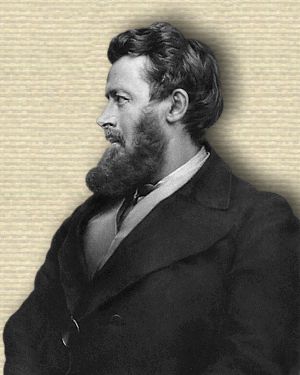 (source)
(source)
|
Walter Bagehot
(3 Feb 1826 - 24 Mar 1877)
English economist and journalist who died in middle age, having been editor of The Economist for 16 years. As a journalist, he was highly regarded as a political thinker, commentator, critic and man of letters. His best-known book is The English Constitution (1867).
|
Science Quotes by Walter Bagehot (6 quotes)
Life is a school of probability.
— Walter Bagehot
In R.H. Hutton (ed.), 'Thomas Babington Macaulay', Literary Studies: By the Late Walter Bagehot (1879), Vol. 2, 257.
One of the greatest pains to human nature is the pain of a new idea.
— Walter Bagehot
In Physics and Politics (1869, 1916), 163.
The greatest pleasure in life is doing what people say you cannot do.
— Walter Bagehot
Attributed. The wording as above may be a popularized derivative from this quote: “The greatest enjoyment possible to man was that which this philosophy promises its votaries—the pleasure of being always right, and always reasoning—without ever being bound to look at anything.” In The English Constitution (1867), 296.
The maxim of science is simply that of common sense—simple cases first; begin with seeing how the main force acts when there is as little as possible to impede it, and when you thoroughly comprehend that, add to it in succession the separate effects of each of the incumbering and interfering agencies.
— Walter Bagehot
Collected in The Works of Walter Bagehot (1889), Vol. 5, 319-320.
We think of Euclid as of fine ice; we admire Newton as we admire the peak of Teneriffe. Even the intensest labors, the most remote triumphs of the abstract intellect, seem to carry us into a region different from our own—to be in a terra incognita of pure reasoning, to cast a chill on human glory.
— Walter Bagehot
In Estimates of Some Englishmen and Scotchmen (1856), 411-412
Writers, like teeth, are divided into, incisors and grinders.
— Walter Bagehot
'The First Edinburgh Reviewers', National Review (1855). Describing writer Sydney Smith: Sydney Smith was a molar. Republished in Littell’s Living Age (24 Nov 1855), 47, No. 600, 461. Bagehot continues about Sydney Smith: “He did not run a long sharp argument into the interior of a question; he did not, in the common phrase, go deeply into it; but he kept it steadily under the contact of a strong, capable, heavy, jaw-like understanding,— pressing its surface, effacing its intricacies, grinding it down.”
See also:
- Physics and Politics, by Walter Bagehot. - book suggestion.
- Booklist for Walter Bagehot.

 In science it often happens that scientists say, 'You know that's a really good argument; my position is mistaken,' and then they would actually change their minds and you never hear that old view from them again. They really do it. It doesn't happen as often as it should, because scientists are human and change is sometimes painful. But it happens every day. I cannot recall the last time something like that happened in politics or religion.
(1987) --
In science it often happens that scientists say, 'You know that's a really good argument; my position is mistaken,' and then they would actually change their minds and you never hear that old view from them again. They really do it. It doesn't happen as often as it should, because scientists are human and change is sometimes painful. But it happens every day. I cannot recall the last time something like that happened in politics or religion.
(1987) -- 


